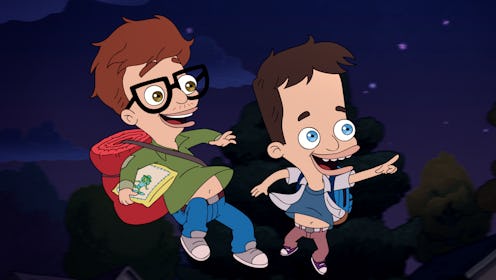Entertainment
Why ‘Big Mouth’ Is The Show You’ll Wish You’d Had When You Went Through Puberty

Big Mouth is a crass and often disgusting animated show with a heart of gold at its core. The first 10 episodes debut on Sept. 29. And while Netflix has yet to announce if there will be Season 2 of Big Mouth, show co-creator Nick Kroll tells Bustle over the phone a few days before the premiere, "There’s a lot more ground to be covered in [regards to] puberty." The Netflix original series from The Kroll Show comedian aims to get the audience laughing, but also hopes to normalize the horrors of those dreaded "life changes" and point out that the show's characters, much like every other teenager that has ever lived, don't have to be alone in this experience.
The first season shows Nick Birch and Andrew Glouberman, who are inspired by show creators and childhood friends Nick Kroll and Andrew Goldberg, as they maneuver the dangerous waters of puberty while falling victim to dreaded "hormone monsters" (the personified bodily urges that boys of that age experience at very inopportune times). Kroll and Goldberg have only just started to dive into the full puberty experience with Big Mouth Season 1.
"To say that we’ve scratched the surface would mean that we’d just ripped a pimple off and it’s getting infected," Kroll says. "That doesn’t mean it’s the end of the pimple or the end of the show." It's an appropriately grotesque metaphor for an appropriately grotesque show.
What sets Big Mouth apart from so many other animated comedies is that it strives to make a point. The show's message, as Kroll puts it, is to "make people not feel alone going through [puberty] and having these feelings." Kroll views puberty as "something that people are afraid to talk about and address, and because of that kids feels unbelievably alone going through it." Kroll and the other drivers of the show had an ambitious goal in mind, but it'll take a lot more than just one season to fully encapsulate the teenage biological experience for both boys and girls.
"There are other ideas and characters that we are interested in [introducing to Big Mouth] that we didn’t have time in 10 episodes to cover," Kroll says. "We’ve got a lot of ideas, 'cause puberty is not a subject that is light on material."
While puberty is fertile ground for comedy, there are also other elements that Kroll hopes to explore in a future season. To him, the show "goes beyond puberty because it’s about kids and about their families and about everything in between."
A second season of Big Mouth isn't in the bag yet, but it is likely. Most of Netflix's adult-oriented animation programs, including F for Family, Castlevania, and BoJack Horseman, have all been renewed for at least one additional season. Big Mouth's closest comparison among those may be BoJack Horseman, which was recently renewed for a fifth season. BoJack Horseman uses animation to deal with the reality of mental illness and depression in a similar way to how Big Mouth uses goofy monsters to portray the horror of puberty. They're both comedy shows that break through social stigma to openly discuss some of the scariest parts of being human. Considering Netflix's track record of enthusiastically renewing animated comedies, it's likely that Kroll will get the opportunity to explore this awkward time further in a second season.
"Puberty is high drama," Kroll says, "it’s high stakes, [with] so much happening physically and emotionally." With such a rich mine to pull from, the creators of Big Mouth have enough material to last well beyond a second season. The animated series is a testament to how scary and confusing puberty can be, and a reminder that no matter how bizarre and lonely it may feel, no one is going through it alone.